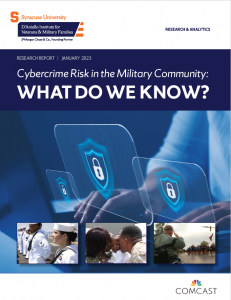Some data suggest that members of the military community are disproportionately impacted by cybercrime, report more incidents, and incur greater losses. Although the overall rate of cybercrimes has increased in recent years within the U.S. and globally, there are several reasons to speculate on why military-connected persons might be targeted. Like civilians, service members, veterans, and their families rely on the internet to conduct professional and personal business, connect socially, store information, and manage their personal finances. Unlike civilians, however, military members and their families also move frequently, have access to valuable military conferred benefits (e.g., retirement, education, health care), and exhibit more trust of philanthropic organizations, making them easy targets for scammers. Moreover, deployed service members often experience greater difficulty to continuously monitor suspicious activity on their accounts. Finally, military-connected individuals are inevitably required to provide sensitive and personal identifying information for security clearances and to prove eligibility for benefits and resources.

